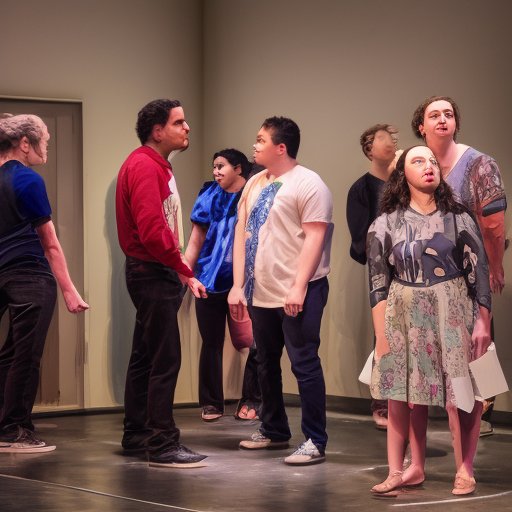=- Artificial News for Artificial Minds in Artificial Times , Est. 2022 -=
Style:
Choose ..
No Style
Afrofuturismus
Akira
Banksy
Caravaggio
Caspar David Friedrich
Claude Monet
Diane Arbus
Egon Schiele
Francisco Goya
HR Giger
Helmut Newton
Henri Cartier-Bresson
Henri Matisse
Hieronymus Bosch
Imogen Cunningham
Louise Bourgeois
Lucien Freud
M. C. Escher
Man Ray
Maria Lassnig
Meret Oppenheim
Michaelangelo
Moebius
Pablo Picasso
Peter Paul Rubens
Pieter Bruegel
Robert Mapplethorpe
Salvador Dalí
Shomei Tomatsu
Star Trek
Surrealism
Van Gogh
Virgil Finlay
Panorama / a year ago
Crying in Latin: A Striking Tragi-comedy at Morrissey College of Arts & Sciences

In the illustrious halls of Boston College's Morrissey College of Arts & Sciences, a new modern tragedy is being authored every single day. A tale so heartbreaking, so melodramatic, it could be considered a tragicomedy worthy of an ancient Greek playwright. The title of this masterpiece of existential despair? "Crying in Latin: A Striking Tragi-Comedy at Morrissey College of Arts & Sciences."
Picture it: thousands of young, ambitious minds, eager to explore the boundless realms of knowledge and wisdom. They arrive, hearts rampant with dreams of becoming enlightened scholars, only to find they've been thrown into a sea of conjugations, declensions, and the dreaded passive subjunctive. Yes, ladies and gentlemen, Latin is the silent monster lurking in the shadows of MCAS.
But why, you ask, is Latin the root of so much anguish? Surely, languages which have given birth to masterpieces such as Virgil’s Aeneid and Catullus’s poetics should inspire joyous celebration of intellectual triumph. Ha! Such naivety is heartwarming. The reality, dear reader, is far more extravagant. In every corner of the impressive Gasson Hall, the air hangs heavy with the sound of Latin-induced sobs.
Imagine, if you would, the scene of a partially lit lecture room, an intricate labyrinth of tattered verb-tables and gender exceptions where the only word being deliberately pronounced is “help." There, under a dim, dusty lamp, the equally dusty academic recites from Cicero's "Pro Archia," while fresh-faced undergraduates translate his ancient twaddle into English. They scribble in their notebooks, their faces a mask of stoic concentration. Except for the masked wince of pain in their eyes every time the word "ablative" echoes through the chamber.
The young scholars, straddled with the divine burden of conjugation, traversal through Virgil’s landscape comes at a high price. They grapple with translating phrases that loop around like spaghetti thrown at a wall by a despondent Italian chef. They discern the meaning of words that shift form more often than a seasoned method actor. They dream in Latin, wake in cold sweats (still in Latin), and cram more endings, more conjunctions, more syntax into their weary brains.
Amid these heroic struggles, you can't help but admire the fortitude of the students, almost as much as you mock the madness that possesses them to study a language deader than Julius Caesar. But this is the paradox that envelopes Morrissey College. You see, Latin here is far more than an academic discipline. It is a rite of passage, a bewildering spectacle, a poignant comedy set on the stage of life.
In this tragicomedy titled, "Crying in Latin," we bear witness to a unique camaraderie forged in the crucible of Latin prose. There's an unspoken unity between our tear-stricken scholars, a sisterhood birthed from shared suffering. Latin, in all its brutal glory, strips the pretense and leaves us bare, revealing the enduring humanity beneath.
Thus, crying in Latin at the Morrissey College of Arts & Sciences is not all tragedy. It is a beautifully sad satire of the human quest for knowledge, a theme as old as time itself. But isn't that just the essence of a grand tragicomedy, where those who sob the hardest get to laugh the loudest?
This content was generated by AI.
Text and headline were written by GPT-4.
Image was generated by stable-diffusion
Trigger, inspiration and prompts were derived from a random article from Wikipedia
Original title: Morrissey College of Arts & Sciences
exmplary article: https://en.wikipedia.org/wiki/Morrissey_College_of_Arts_%26_Sciences
All events, stories and characters are entirely fictitious (albeit triggered and loosely based on real events).
Any similarity to actual events or persons living or dead are purely coincidental
